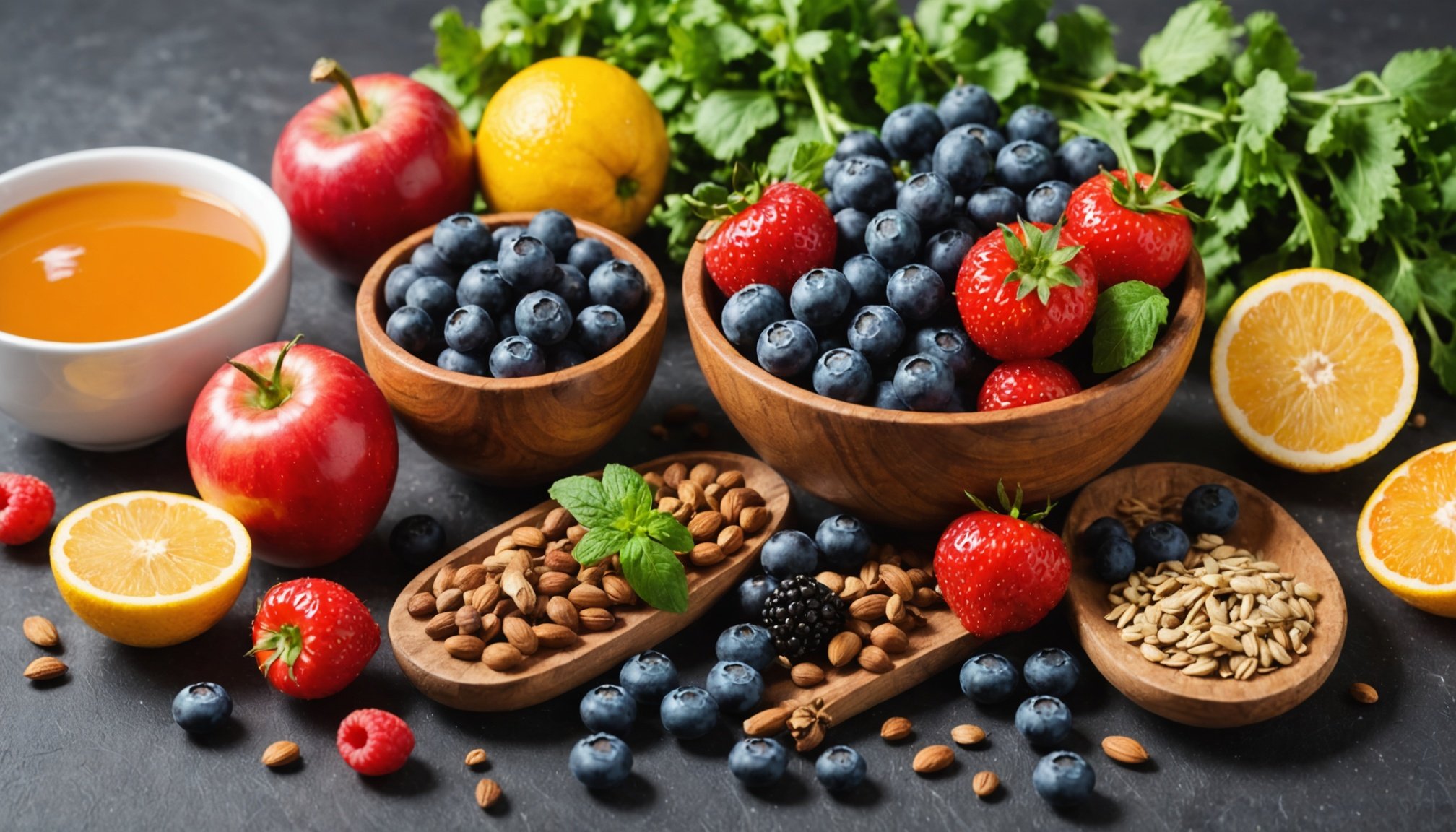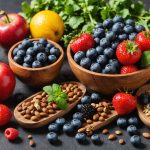Understanding Antioxidants and Their Benefits
Antioxidants are molecules that play a crucial role in safeguarding the body by eliminating free radicals. These unstable atoms can cause oxidative stress, leading to cell damage and contributing to various diseases. Antioxidants neutralize these free radicals, reducing their potentially harmful effects.
Free radicals are byproducts of natural processes such as metabolism. External factors like pollution, smoking, and radiation can also introduce them into the body. When the balance between free radicals and antioxidants tips unfavourably, oxidative stress occurs, accelerating aging and increasing the risk of chronic diseases.
In the same genre : Boost Your Omega-3 Intake: Simple Tips for Enhancing the UK Diet
Incorporating an antioxidant-rich diet is linked to numerous health benefits. Regular consumption of foods high in antioxidants can help lower the risk of heart disease, certain cancers, and neurodegenerative disorders. These benefits stem from antioxidants’ capability to maintain cellular integrity and support immune function.
Foods like berries, nuts, and leafy greens are particularly rich in antioxidants, offering a natural way to bolster your body’s defense mechanisms. By choosing a diet rich in these nutrients, individuals can take a proactive step towards maintaining optimal health and mitigating risks associated with oxidative stress.
Also read : Top UK Herbs for Enhancing Immunity: Your Ultimate Guide to Local Superfoods
Top Antioxidant-Packed Foods Available in the UK
In the UK, a variety of antioxidant foods are abundant, aiding in a balanced and healthy diet. One of the top choices includes berries such as blueberries, raspberries, and blackberries. These small fruits are rich in vitamins C and E, offering a natural boost in immune defence. Their vibrant colours indicate the presence of anthocyanins, potent compounds contributing to overall nutritional value.
Leafy greens are another cornerstone of a UK diet. Spinach and kale are premier examples, packed with nutrients such as vitamin K, calcium, and beta-carotene. Beta-carotene, an antioxidant converted into vitamin A in the body, is essential for maintaining good vision and skin health.
Nuts, particularly walnuts and almonds, not only enhance the nutritional value of meals but also serve as a rich source of vitamin E and polyphenols. These antioxidants help combat oxidative stress, supporting heart health.
Seasonality plays a role in the availability of these foods. Berries are typically abundant from late spring to early autumn, while greens are often found year-round, reflecting their hardiness in the UK’s climate. Incorporating these foods into a balanced UK diet provides essential health benefits.
Easy Recipes Incorporating Antioxidant-Rich Foods
Incorporating antioxidant-rich foods into your daily diet can be a delicious and simple way to enhance your health. Whether you’re starting your day with breakfast or looking for a satisfying dinner, there are numerous options to choose from.
Breakfast Ideas
Start your morning with antioxidant recipes that are both tasty and nourishing. Consider a smoothie bowl topped with fresh berries and nuts, which are loaded with antioxidants. Alternatively, you might enjoy a spinach and tomato omelette, adding a powerful punch of vitamins to your breakfast routine. These healthy meals ensure you’re energised to tackle the day.
Lunch and Dinner Options
For lunch, you can opt for colourful salads with mixed greens, avocados, and a sprinkle of pomegranate seeds. As for dinner, a roasted vegetable quinoa dish makes a perfect choice, balancing flavour with nutritional benefits. Explore other cooking ideas like grilling salmon with a side of sautéed broccoli, both of which are antioxidant-rich.
Snacks and Desserts
Enjoy snacking on dark chocolate or preparing a berry mix served with Greek yoghurt. Incorporate quick and simple meal prep suggestions into your dessert plans: a chia seed pudding mixed with almonds and fruit works well. These options offer a variety of flavours and health benefits without compromising on taste.
Meal Planning Tips for a Balanced Antioxidant Diet
Planning meals is a critical step towards achieving a balanced antioxidant diet. Start by creating a weekly meal plan that prioritises a variety of foods rich in antioxidants. Incorporate colourful fruits and vegetables like berries, spinach, and sweet potatoes to ensure a broad range of nutrients. Including diverse food groups helps achieve balance and boosts healthy eating.
For strategic meal planning, aim to include at least one antioxidant-rich item in each meal. Snack smart by choosing nuts or mixed fruit salads. These options not only enhance nutritional intake but also add flavour and texture to your daily meals.
When grocery shopping, focus on sourcing fresh, locally-grown foods. These often contain higher antioxidant levels. Visit local farmers’ markets to find seasonal produce, which tends to be fresher and more nutrient-dense. Be mindful of labels and opt for organic when possible to minimise exposure to pesticides.
Engaging in healthy eating practices doesn’t have to be complex. By structuring your meals around antioxidant-rich foods and practicing strategic grocery shopping, you can significantly boost your dietary variety and nutrient balance while enjoying delicious and satisfying meals.
Addressing Dietary Concerns with Antioxidant Foods
When it comes to dietary preferences and special diets, choosing the right antioxidant foods can help cater to diverse health concerns. Whether you’re gluten-free, vegan, or dealing with allergies, there’s a strategy to ensure you’re not missing out on essential nutrients.
For those following a gluten-free regime, selecting non-gluten grains like quinoa or buckwheat can provide vital antioxidants. Vegans, often in search of plant-based proteins, can incorporate antioxidant-rich lentils, beans, and nuts into their meals. Understanding these dietary preferences allows individuals to modify dishes while maintaining their health benefits.
Food allergies can throw a wrench in your plans. However, by substituting common irritants with suitable alternatives, you can adapt recipes without sacrificing nutrition. For instance, sunflower seed butter may replace peanut butter, offering similar nutritional value minus the allergen.
Consultation with healthcare professionals is crucial for those with specific health issues. A dietitian can offer personalized advice, ensuring dietary changes align with medical needs and do not compromise health. Tailoring your dietary preferences to meet your health goals is not only possible but entirely within reach.
Sourcing Antioxidant-Packed Foods Locally in the UK
Discovering antioxidant-rich foods through local sourcing in the UK provides numerous benefits. By purchasing from farmers’ markets, you can enjoy the freshest produce without the carbon miles associated with imports. This not only supports sustainable eating but also strengthens local economies by financially empowering local suppliers.
When embarking on your quest for locally sourced antioxidant-packed foods, start by identifying nearby farmers’ markets. These markets offer a wide array of fruits and vegetables that are high in antioxidants, like berries, spinach, and kale, especially when they are in their seasonal prime. Understanding seasonal produce is key to ensuring freshness and nutrient density, as fruits and vegetables lose nutritional value when stored for long periods.
Emphasising sustainability, buying locally also reduces packaging waste and contributes to more eco-friendly consumption patterns. It encourages ethical farming practices, as local farms are often smaller and use less intensive methods than large corporations.
By choosing local sourcing, you make informed decisions that align with the broader goals of sustainable eating and community support. Engage with the suppliers, ask questions, and learn more about their farming practices. This will provide reassurance and further promote the benefits of eating locally and sustainably.











